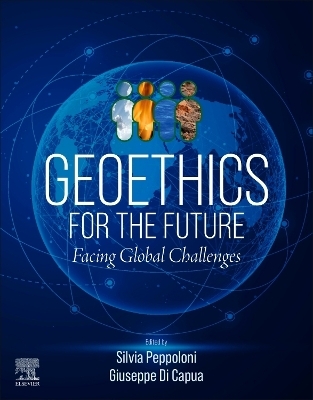
Geoethics for the Future
Elsevier - Health Sciences Division (Verlag)
978-0-443-15654-0 (ISBN)
Serving as a significant milestone in geoethics, this book provides academics, researchers and students with insights into the ethical and societal dimensions of various challenges arising from human impact on the Earth system.
Silvia Peppoloni is a Geologist, Researcher at the Istituto Nazionale di Geofisica e Vulcanologia (Italy). She focuses her scientific activity on natural risks and hazards, along with exploring the social aspects of Earth sciences. She is an international leader of geoethics, fully involved in the base research on ethical, social, and cultural implications of geoscience knowledge, research, and practice, and on key concepts for society such as sustainability, prevention, adaptation, and geoeducation. She is a cofounding member and Secretary General of the International Association for Promoting Geoethics; Chair of the Commission on Geoethics of the International Union of Geological Sciences; Chair holder of the Chair on Geoethics of the International Council for Philosophy and Human Sciences; Director of the School on Geoethics and Natural Issues; and Editor-in-Chief of the SpringerBriefs in Geoethics series and the Journal of Geoethics and Social Geosciences. Giuseppe Di Capua is a Geologist, Technologist at the Istituto Nazionale di Geofisica e Vulcanologia (Italy). His scientific studies are focused on engineering geology, geoethics, philosophy of geosciences, and social geosciences. He is a cofounding member, treasurer, webmaster, and social media manager of the International Association for Promoting Geoethics; member of the Commission on Geoethics of the International Union of Geological Sciences; and member of the Executive Committee of the International Council for Philosophy and Human Sciences; Member of the Editorial Board of the SpringerBriefs in Geoethics series and the Journal of Geoethics and Social Geosciences.
About the editors Acknowledgments Introduction Ouverture: Grounding Geoethics through Philosophical Analyses 1. The divergent philosophical and scientific accounts of the root of human ethics 2. Order and Place in Environmental Ethics and Aesthetics 3. The Relationship Between Human and Nature in Modern Culture Geoethics and the Anthropocene: Defining an Ethical Framework for Earth System Governance 4. Making Sense of the Anthropocene: Facts, Meanings, Implications 5. Etiology of the Ecological Crisis: Building New Perspectives for Human Progress Through Geoethics 6. Geoethics and the Anthropocene: Five Perspectives 7. Challenging Buzzideas: Global Challenge Phrases Undermining Ethical Action 8. From Biophilia to Geophilia: A Challenging but Necessary Expansion 9. Geoethics in the Anthropocene: Law as a game changer 10. Matters of Environmental Politics to Inform Geoethics 11. Geoethical Thinking as Geogovernance: A Geopolitical Theology Perspective 12. Historic Perspectives for Responsible Earth System Governance 13. Earth system governance: A governance perspective on geoethics Empowering the Geoscience-Society Interface with Geoethical Perspectives 14. Geoscience for Earth Stewardship, Sustainability and Human Well-being: A conceptual framework for integrating planet, prosperity and people 15. Geoscience-society interface: How to improve dialogue and build actions for the benefit of human communities 16. The Key Groups of Interest in Geoscience for Sustainability 17. Significance and Insights from Indigenous Communities in Latin America: Cultural and Societal Factors and Challenges in UNESCO Global Geoparks 18. Delivering Critical Raw Materials: Ecological, Ethical and Societal Issues 19. Critical Minerals and Rare Earths Elements: Ethical and Societal Considerations 20. The Future of Mining: Technical Progress and Its Implications 21. Strategic planning towards sustainable urban planning models? The case of municipal directors in Denmark 22. Multi-hazard analyses and their implications for the defense of society against natural phenomena 23. Responsible volcano risk management 24. Risk Communication in a Rapidly Evolving Environment: The Ethical and Societal Challenges Geoethics to Shape New Educational Models for Future Planetary Citizens 25. Geoscience Education: Changing Paradigms 26. A global geoscientific skills gap is threatening a sustainable future 27. Educating on Sustainable Development in Latin America: Lights and Shadows 28. Effective Strategies, Data, and Tools for Teaching Geoethics 29. Engaging the climate crisis with art
| Erscheinungsdatum | 07.09.2024 |
|---|---|
| Verlagsort | Philadelphia |
| Sprache | englisch |
| Maße | 216 x 276 mm |
| Gewicht | 1170 g |
| Themenwelt | Naturwissenschaften ► Biologie ► Ökologie / Naturschutz |
| Sozialwissenschaften ► Soziologie | |
| Technik ► Umwelttechnik / Biotechnologie | |
| Wirtschaft ► Volkswirtschaftslehre | |
| ISBN-10 | 0-443-15654-9 / 0443156549 |
| ISBN-13 | 978-0-443-15654-0 / 9780443156540 |
| Zustand | Neuware |
| Haben Sie eine Frage zum Produkt? |
aus dem Bereich


